|
|
|
Sort Order |
|
|
|
Items / Page
|
|
|
|
|
|
|
| Srl | Item |
| 1 |
ID:
130242
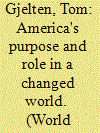

|
|
|
|
|
| Publication |
2014.
|
| Summary/Abstract |
The presidencies of George W. Bush and Barack Obama suggest what doesn't work in efforts to promote US influence in the world. By ordering an ill-conceived invasion of Iraq, Bush alienated US allies. His policies of secretly imprisoning Islamist militants and then subjecting them to "enhanced" interrogation and indefinite detention at Guantánamo struck Muslims everywhere as evidence of a war on Islam. Barack Obama, elected as the most explicitly anti-war president since Woodrow Wilson, came into office determined to undo the international damage done by his predecessor. "The walls between old allies on either side of the Atlantic cannot stand," Obama said in Berlin in 2008, and a year later, speaking in Cairo, he promised "a new beginning" with the Muslim world, with relations "based upon mutual interest and mutual respect." As promised, he withdrew US combat troops from Iraq. By 2013, however, Obama had fared little better than Bush in his global outreach. According to the Pew Research Center, support for the United States in Egypt, Jordan, Lebanon, and Pakistan was actually lower than it had been in the last year of the Bush administration. In Europe, the US favorability rating was higher than it was under Bush, but it had fallen steadily in the years since Obama took office, and it remained far below where it stood in 2000. One possible lesson from these years is that presidential personalities, speeches on foreign stages, and the changing international opinions of US policies matter less than we might think. Perhaps the most reliable measure of America's standing in the world is how appealing the country is to all those who are considering migration. Since 2007, Gallup surveys in more than one hundred and fifty countries have shown that the United States is far and away the number one favored destination. The most recent survey projected that one hundred and thirty-eight million people worldwide would like to move permanently to the United States, more than three times the number who would choose the United Kingdom, the second most favored destination. Those numbers show the United States still represents opportunity and promise to people around the world, and it is clearly in the US global interest to maintain that reputation.
|
|
|
|
|
|
|
|
|
|
|
|
|
|
|
|
| 2 |
ID:
133167
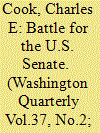

|
|
|
|
|
| Publication |
2014.
|
| Summary/Abstract |
The battle for control of the U.S. House of Representatives was over before it even started, but the fight for control of the U.S. Senate is proving to be a knock-down, drag-out affair that could easily go either way.
Control of the U.S. House is pretty much a settled affair. Republicans occupy 93 percent of the congressional districts that GOP presidential nominee Mitt Romney carried in 2012, and Democrats hold 96 percent of the districts that Obama won. As a result, there are very few "fish out of water," or Republicans sitting in Democratic-leaning districts or Democrats in GOP-tilting districts. Yes, there are a large number of open House seats this cycle, but most are in districts which safely belong to one side or the other. It would seem that the next realistic shot Democrats have at winning control of the House would come in 2022, after the next round of redistricting takes place in 2021. The 2018 and 2020 gubernatorial and state legislative elections will determine which party in each state has the dominant hand in the redistricting process. Republicans had it in most states in 2011, and Democrats want it badly in 2021.
|
|
|
|
|
|
|
|
|
|
|
|
|
|
|
|
| 3 |
ID:
158797
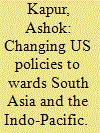

|
|
|
| 4 |
ID:
105446
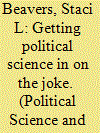

|
|
|
|
|
| Publication |
2011.
|
| Summary/Abstract |
The challenges of teaching introductory-level U.S. politics to reluctant audiences are well known and widely lamented. This article investigates the pedagogical potential of political satire, specifically The Daily Show with Jon Stewart, in engaging students in this tough-to-teach course. Based on a review of available literature and student survey data from the fall 2008 term, I argue that using this popular program in the classroom can enhance an introductory U.S. politics course. A review of both these survey data and student papers based on the program suggests promising possibilities for encouraging students' political engagement and critical-thinking skills. This preliminary examination demonstrates that further study on the program's potential both for student engagement and student learning outcomes is warranted.
|
|
|
|
|
|
|
|
|
|
|
|
|
|
|
|
| 5 |
ID:
121090
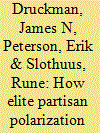

|
|
|
|
|
| Publication |
2013.
|
| Summary/Abstract |
Competition is a defining element of democracy. One of the most noteworthy events over the last quarter-century in U.S. politics is the change in the nature of elite party competition: The parties have become increasingly polarized. Scholars and pundits actively debate how these elite patterns influence polarization among the public (e.g., have citizens also become more ideologically polarized?). Yet, few have addressed what we see as perhaps more fundamental questions: Has elite polarization altered the way citizens arrive at their policy opinions in the first place and, if so, in what ways? We address these questions with a theory and two survey experiments (on the issues of drilling and immigration). We find stark evidence that polarized environments fundamentally change how citizens make decisions. Specifically, polarization intensifies the impact of party endorsements on opinions, decreases the impact of substantive information and, perhaps ironically, stimulates greater confidence in those-less substantively grounded-opinions. We discuss the implications for public opinion formation and the nature of democratic competition.
|
|
|
|
|
|
|
|
|
|
|
|
|
|
|
|
| 6 |
ID:
110950
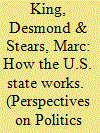

|
|
|
|
|
| Publication |
2011.
|
| Summary/Abstract |
Many existing accounts of the American state search for identifiable features of stateness recognizable from the comparative politics of state theory. These are less present in the US because of a distinct history, institutional separation of powers, and an ideological populism based in opposition to public sector expansion. Despite these constraints the American state is a powerful actor in US politics and has been since the nineteenth century engaged in familiar revenue raising, regulatory, public order, coercive, military, and distributive functions. To understand these we propose a framework based on how the endogenous drive to standardize shapes these functions and gives a distinct character to the American state. We identify impulses to standardize, instruments of standardization, and enduring obstacles to this agenda.
|
|
|
|
|
|
|
|
|
|
|
|
|
|
|
|
| 7 |
ID:
115056
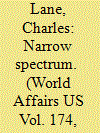

|
|
|
|
|
| Publication |
2012.
|
| Summary/Abstract |
To understand the race for the Republican presidential nomination-and the role that foreign policy issues have played in it so far-it helps to recall the lay of the political land as it appeared in the first half of 2009; that is, the point at which any potential contenders for 2012 had to start planning a run.
|
|
|
|
|
|
|
|
|
|
|
|
|
|
|
|
| 8 |
ID:
174848
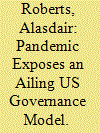

|
|
|
|
|
| Summary/Abstract |
Since the 1990s and Bill Clinton’s embrace of key parts of Ronald Reagan’s legacy, mainstream US governance has been guided by a bipartisan consensus around a formula of shrinking the federal government’s responsibilities and deregulating the economy. Hailed as the ultimate solution to the age-old problem of governing well, the formula was exported to the developing world as the Washington Consensus. Yet growing political polarization weakened the consensus, and in a series of three major crises over the past two decades—9/11, the global financial crisis, and the COVID-19 pandemic—US policymakers opted for pragmatism rather than adherence to the old formula, which appears increasingly inadequate to cope with current governance challenges.
|
|
|
|
|
|
|
|
|
|
|
|
|
|
|
|
| 9 |
ID:
158384
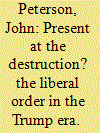

|
|
|
|
|
| Summary/Abstract |
The election of Donald Trump in 2016 sent shock waves across political classes globally and prompted debates about whether his ‘America first’ agenda threatened the liberal international order. During his first year in office, Trump seemed determined to undermine the hallmarks of the liberal international order: democracy, liberal economics and international cooperation. So, are we witnessing the emergence of a “post-liberal” and “post-American” era? Four sources of evidence help frame – if not answer – the question: history, the crisis of liberal democracy, Trump’s world view, and the power of civil society (globally and nationally) to constrain any US President. They yield three main judgements. First, continuity often trumps change in US foreign policy. Second, the liberal international order may have been more fragile pre-Trump than was widely realised. Third, American power must be put at the service of its own democracy if the US is to become the example to the world it used to be.
|
|
|
|
|
|
|
|
|
|
|
|
|
|
|
|
| 10 |
ID:
119480
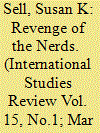

|
|
|
|
|
| Publication |
2013.
|
| Summary/Abstract |
For the first time in thirty years of ever stronger intellectual property policies, a transnational coalition of Internet users was able to kill two US anti-piracy bills that were backed by some of the most politically connected and economically powerful interests in US politics. Combining insights from the literatures on social movements, networks, and Internet activism, I analyze the structure for social mobilization, the form of the coalition, the role of framing, and the use of technology contributing to its success. The literature on social movements and contentious politics addresses situations of threats or grievances that lead actors to mobilize for collective action. In this case, Goliath's latest gambit to ratchet up intellectual property standards threatened David's use of the Internet. This time David beat Goliath.
|
|
|
|
|
|
|
|
|
|
|
|
|
|
|
|
| 11 |
ID:
098998
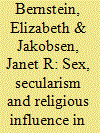

|
|
|
|
|
| Publication |
2010.
|
| Summary/Abstract |
Through an analysis of alliances between secular and religious actors in US politics and a specific case study on anti-trafficking policy, we show that the intertwining of religion and politics in the US comes from two sources: 1) the secular political and cultural institutions of American public life that have developed historically out of Protestantism, and which predominantly operate by presuming Protestant norms and values; and 2) the direct influence on US politics of religious groups and organisations, particularly in the past quarter-century of lobby groups and political action committees identified with conservative evangelical Christianity. The sources of policies that promote gender and sexual inequality in the US are both secular and religious and we conclude that it is inaccurate to assume that religious influence in politics is necessarily conservative or that more secular politics will necessarily be more progressive than the religious varieties.
|
|
|
|
|
|
|
|
|
|
|
|
|
|
|
|
| 12 |
ID:
173967
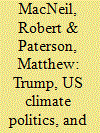

|
|
|
|
|
| Summary/Abstract |
This paper argues that the Trump administration’s position on climate change should be understood more in terms of continuity than disjuncture. It develops this argument in four principal ways. First, it situates Trump in the US’s paradoxical relationship to the UNFCCC, as a would-be leader that struggles to commit itself to substantive action, and the evolving geopolitics within the UNFCCC. Second, the paper focuses on an on-going struggle between pro-fossil fuel interests and a ‘decarbonising’ bloc, interpreting Trump (like George W. Bush) as a pro-fossil fuel backlash. Third, it explores the pattern of climate politics within the US, where stalemate in Congress has been often offset by action at the state, city, and corporate levels. Fourth, it should be understood in relation to the emergence of a ‘global climate governance complex’, where the UNFCCC has to be understood in relation to multilevel and transnational governance initiatives on climate change.
|
|
|
|
|
|
|
|
|
|
|
|
|
|
|
|
| 13 |
ID:
192560
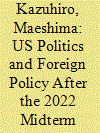

|
|
|
|
|
| Summary/Abstract |
This article analyzes the results of the 2022 US midterm elections and looks ahead to the trends in US political diplomacy after the elections. Results from the midterm elections were more successful than expected for the Democratic Party, and there appears to be a tailwind for the Joe Biden administration. However, the international situation remains difficult to navigate due to the ongoing divisions in the US, the situation in Ukraine, and tensions in the Taiwan Strait. It then discusses how Japan should respond to the worsening security environment after the elections, including some long-term perspectives. Japan and the US need to transform the mindset from mere alliance maintenance of the past to develop ways to fully utilize the alliance (alliance projection), and to cooperate in preventing moves to change the status quo in the Indo-Pacific region. The Kishida Fumio administration issued three revised security documents, including the National Security Strategy, in December 2022, and Japan is now moving toward having not only a “shield” but also a “spear.” In order to deepen the Japan-US alliance and to work with the Indo-Pacific nations, it is essential to gain strong support from the public.
|
|
|
|
|
|
|
|
|
|
|
|
|
|
|
|
|
|
|
|
|